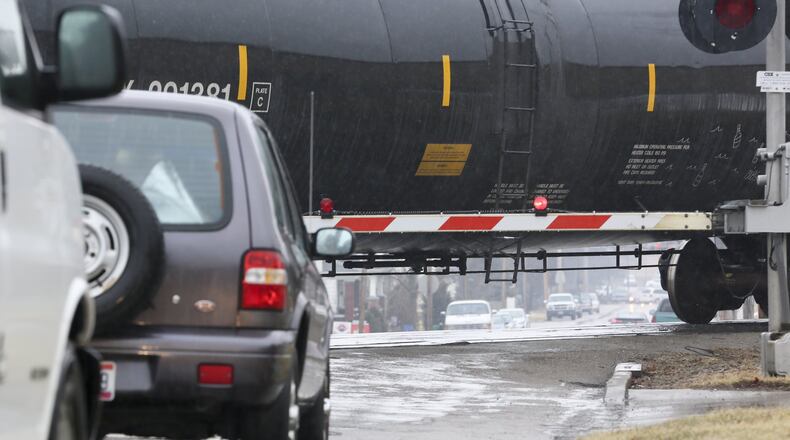CSX Railroad has been cited under that ordinance five times so far this year in Hamilton, according to court records reviewed by the Journal-News. In 2015, there were eight violations cited into court. There were seven cases that were cited into court in 2014.
The last time the railroad was cited was Nov. 16, when it was charged with 15 counts of violating city ordinance. The railroad entered a no contest plea and the end result was a $750 fine plus $81 in court costs paid by CSX.
The newspaper reported last year that some local and state leaders were demanding bigger fines for stopped trains after problems residents in Hamilton and Hanover Twp. were having with blocked rail crossings creating possible public safety issues.
“You can’t block these streets over a long period of time because it creates a dangerous situation for emergency responders or for people who need medical attention,” Bruce Henry, Hanover Twp. administrator, told the Journal-News this month.
One of the incidents cited in that report was when an CSX train broke down in March 2015 in Hamilton and blocked multiple railroad crossings — essentially cutting the city in half — for several hours. In the end, the railroad was fined $1,500 and court costs.
That incident and others led then-state Rep. Tim Derickson to have legislation drawn up to grant townships more powers over fines for blocked rail crossings.
In addition to drawing up the legislation, Derickson also directed the state’s legislative service commission to survey area municipalities on how much they fine trains for blocking roads.
“It took a lot of meetings with railroad officials in Columbus,” Derickson said. “After a number of meetings in Columbus and in Butler County, the railroad agreed to stop blocking crossings.”
After that understanding was reached, Derickson didn’t feel the need to move forward and introduce the legislation but told the Journal-News “it stands at the ready” if needed in the future.
Derickson, who was serving his fourth term and could not seek re-election, stepped down from the Ohio House in August. He is now director of the state funeral board.
Henry said there has been one incident this year where a railroad crossing was blocked for an extended amount of time in Hanover Twp.
“They made some changes after a couple of meetings with CSX officials,” he said. “Our working with them has helped to improve the situation and it’s gotten a lot better.”
Pratt said city Ordinance 553.01 prohibits trains from blocking or obstructing streets for more than five minutes and the penalty against a train company could be a fine not to exceed $1,000.
However, the ordinance “does not apply to obstruction of a public street, road, or highway by a continuously moving through train or caused by circumstances wholly beyond the control of the railroad company.”
Because of that, Pratt said he did not think it would be “appropriate” to issue a citation in the Dec. 12 incident because it was the result of a mechanical breakdown of the locomotive pulling the train and another one had to be sent to take over pulling the train.
The city’s ordinance also requires at the end of every five-minute period of obstruction that the railroad company split up the train for three minutes so traffic can resume through the crossings.
About the Author

